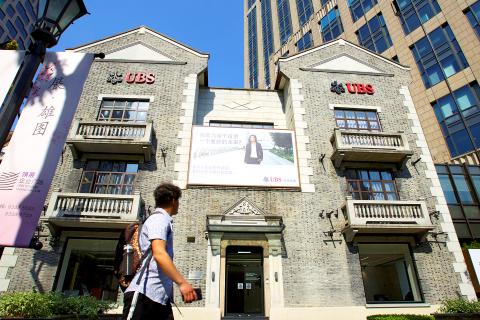UBS AG has lost a lead role on a US dollar bond deal for state-backed China Railway Construction Corp (CRCC, 中國鐵建), just days after a Chinese outcry over a senior UBS economist’s use of “pig” in connection with Chinese food price inflation.
While UBS apologized for the remark on Thursday and put the analyst on leave on Friday, the furor led Haitong International Securities (海通國際證券), a leading Chinese brokerage, to suspend all business with the Swiss group as some Chinese bankers and analysts criticized the bank for a lack of cultural awareness.
Yesterday, a spokesman at Chinese infrastructure giant CRCC that confirmed it had dropped the Swiss banking giant from the deal, but did not give a reason.

Photo: Reuters
The decision was taken because of the controversy over the pig comment, according to a source at the bank, who declined to be named as he was not authorized to talk to media.
A UBS spokesman declined to comment.
The upset stemmed from a remark by Paul Donovan, global chief economist at UBS’ wealth management business since 2016, in a podcast on Wednesday, which was then transcribed and posted on the bank’s Web site. It has since been taken down.
In the podcast, Donovan said that consumer prices in China had risen mainly due to sickness among pigs.
“Does this matter? It matters if you are a Chinese pig. It matters if you like eating pork in China,” Donovan said in comments some took offense at because of a perceived reference to people, not livestock.
The fierce outcry has taken many other Western banks by surprise.
In at least two Wall Street institutions bankers said their colleagues were discussing which words they should avoid following the UBS pig furore.
UBS analysts have also been asked informally by managers to be very careful about the use of words when referring to China or Chinese entities, sources with knowledge said.
“One of our economists came to me and asked me if we should prepare a list of words that we should always avoid mentioning in China-related reports. I thought he was joking, but he was serious,” one senior banker said.
The row came as global investment banks are gearing up for a push into China following rule changes that allow them to control their securities joint ventures.
UBS was the first in November last year to win approval under the rule changes. In March, JPMorgan Chase & Co and Japan’s Nomura Holdings Inc also got the nod.
“You can’t ignore the timing of this controversy — foreign brokerages are looking for a bigger footprint in China and the local houses are beginning to get worried about the impact of that on their market share. So they are not going to miss any excuse to go after the foreigners,” said a banker whose employer has been approved for 51 percent control.

NO BREAKTHROUGH? More substantial ‘deliverables,’ such as tariff reductions, would likely be saved for a meeting between Trump and Xi later this year, a trade expert said China launched two probes targeting the US semiconductor sector on Saturday ahead of talks between the two nations in Spain this week on trade, national security and the ownership of social media platform TikTok. China’s Ministry of Commerce announced an anti-dumping investigation into certain analog integrated circuits (ICs) imported from the US. The investigation is to target some commodity interface ICs and gate driver ICs, which are commonly made by US companies such as Texas Instruments Inc and ON Semiconductor Corp. The ministry also announced an anti-discrimination probe into US measures against China’s chip sector. US measures such as export curbs and tariffs

The US on Friday penalized two Chinese firms that acquired US chipmaking equipment for China’s top chipmaker, Semiconductor Manufacturing International Corp (SMIC, 中芯國際), including them among 32 entities that were added to the US Department of Commerce’s restricted trade list, a US government posting showed. Twenty-three of the 32 are in China. GMC Semiconductor Technology (Wuxi) Co (吉姆西半導體科技) and Jicun Semiconductor Technology (Shanghai) Co (吉存半導體科技) were placed on the list, formally known as the Entity List, for acquiring equipment for SMIC Northern Integrated Circuit Manufacturing (Beijing) Corp (中芯北方積體電路) and Semiconductor Manufacturing International (Beijing) Corp (中芯北京), the US Federal Register posting said. The

India’s ban of online money-based games could drive addicts to unregulated apps and offshore platforms that pose new financial and social risks, fantasy-sports gaming experts say. Indian Prime Minister Narendra Modi’s government banned real-money online games late last month, citing financial losses and addiction, leading to a shutdown of many apps offering paid fantasy cricket, rummy and poker games. “Many will move to offshore platforms, because of the addictive nature — they will find alternate means to get that dopamine hit,” said Viren Hemrajani, a Mumbai-based fantasy cricket analyst. “It [also] leads to fraud and scams, because everything is now

MORTGAGE WORRIES: About 34% of respondents to a survey said they would approach multiple lenders to pay for a home, while 29.2% said they would ask family for help New housing projects in Taiwan’s six special municipalities, as well as Hsinchu city and county, are projected to total NT$710.65 billion (US$23.61 billion) in the upcoming fall sales season, a record 30 percent decrease from a year earlier, as tighter mortgage rules prompt developers to pull back, property listing platform 591.com (591新建案) said yesterday. The number of projects has also fallen to 312, a more than 20 percent decrease year-on-year, underscoring weakening sentiment and momentum amid lingering policy and financing headwinds. New Taipei City and Taoyuan bucked the downturn in project value, while Taipei, Hsinchu city and county, Taichung, Tainan and Kaohsiung